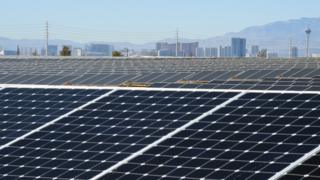Solar panel imports ‘harm US producers’
 Image copyright
Image copyright
Getty Images
Imports of solar panels have harmed US manufacturers, the US International Trade Commission ruled on Friday.
The decision was a win for the two US-based producers that brought the case, saying their business had been hurt by a flood of foreign products.
President Donald Trump will decide on potential remedies for the industry.
The case is controversial, as US firms that install and assemble panels worry that more expensive products could slow the industry’s growth.
The commission has several more weeks to make a recommendation for how President Trump should proceed. A remedy, which could include tariffs or quotas, has not been decided.
Mr Trump has made America First a signature part of his trade policy, speaking in favour of greater protections for US companies and jobs.
- Is the US solar industry about to tear itself apart?
- Future Energy: China leads world in solar power production
The case was brought by Suniva and SolarWorld Americas, which are majority-owned by overseas businesses and face financial troubles.
They say more than two dozen US solar panel manufacturing operations have stopped in recent years as imports surged.
Attorney Timothy Brightbill, who represented SolarWorld, called the decision a “win for American manufacturing” and the solar industry.
Image copyright
Getty Images
SolarWorld employs about 300 people in Oregon, down from 1,300 at the peak, but the firm is hopeful this decision will help the business return to growth, he said.
“In order to have a strong solar industry, we need to have manufacturing in America as a key component,” he said.
A ‘shakedown’?
The US solar industry employs about 260,000 people, according to the Solar Energy Industries Association.
The organisation’s president and chief executive, Abigail Ross Hopper, said the trade commission’s decision was “disappointing”.
She criticised the tariffs proposed by Suniva as relief, arguing that they would increase prices and drive many other solar energy companies out of business.
The US has already imposed tariffs on Chinese solar panels, which led to increased imports from other countries. A remedy in this case would apply to all countries.
“As the remedy phase moves forward, I am determined to reach a conclusion that will protect the solar industry, our workers and the American public from what amounts to a shakedown by these two companies,” Ms Hopper said.

